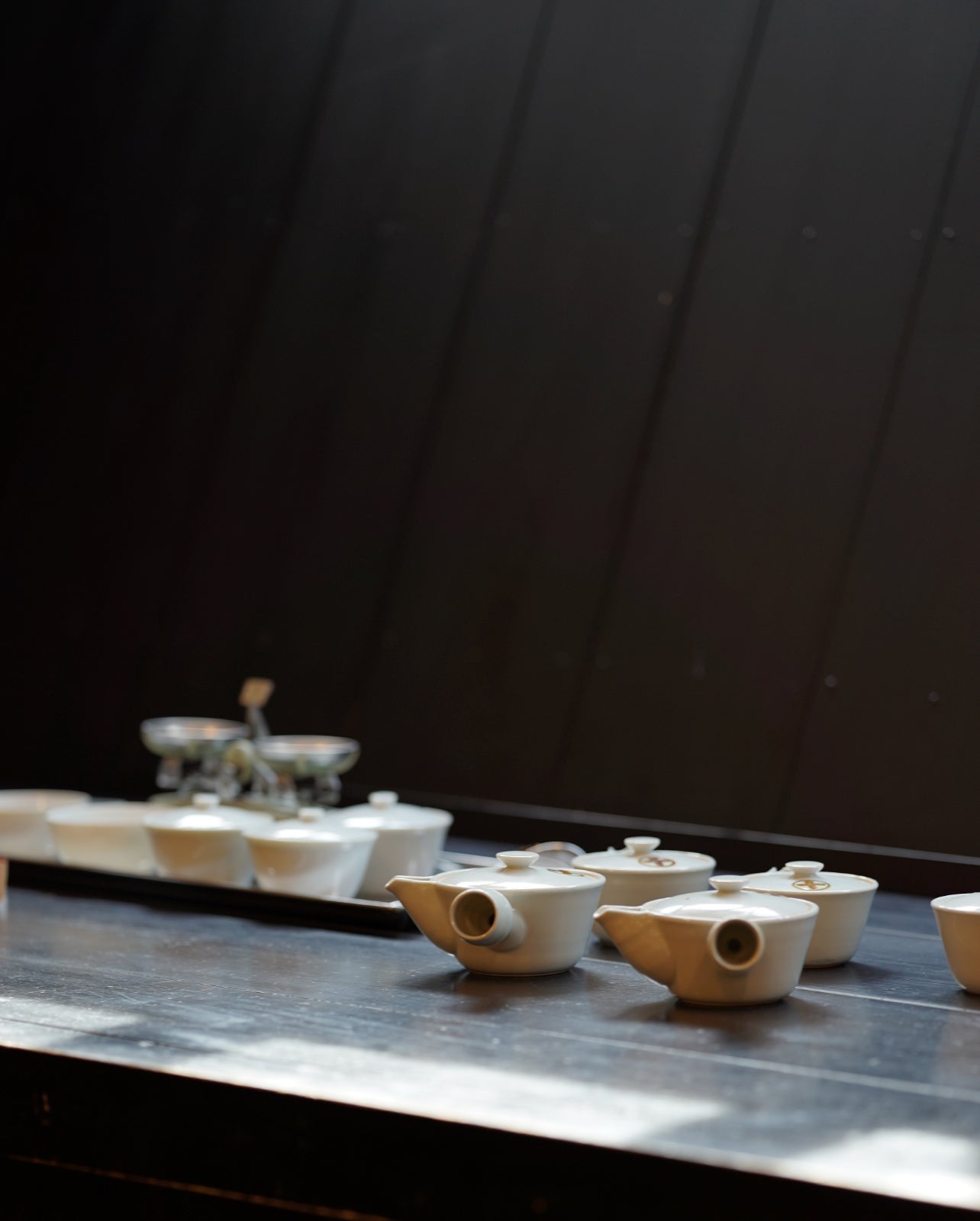お茶をおいしく淹れるコツ
本店では、銘茶売場にて季節のおすすめ茶を試飲いただけます。お客様から「やっぱり家とは違う」「同じ茶葉でも味が出ない」といったお声をいただくことがよくあります。
確かに、お茶は同じ葉でも淹れ方ひとつで風味ががらりと変わる、とても繊細な飲みものです。
おいしさを左右するのは「条件」。つまり、なぜ風味が変わるのかという“理由”を知ることが、美味しさへの近道です。
お茶の味と香りは、お茶の味や香りは「茶葉の量、お湯の量、お湯の温度、待ち時間」で決まり、特に「湯温と抽出時間」は、成分の溶け出す量に直接関わります。
わたしたちが意識する淹れ方のコツを丁寧にご紹介いたします。
湯温で変わる、味の世界
お茶の味わいは、成分がどれだけ抽出されるかで決まります。
特に、湯温はその鍵を握る大切な要素です。
| 湯温 | 味の特徴 | おすすめのお茶 |
|---|---|---|
| 60℃前後 | 甘味・旨味を引き出す | 玉露 |
| 80℃前後 | 甘味と苦渋味のバランス カテキン(渋味)やカフェイン(苦味)は、80℃以上でよく溶け出します |
煎茶・かぶせ茶 |
| 90~100℃ | 熱湯を使うことで香ばしさや焙煎香が際立つ 香り成分は、高温でこそ立ち上がります |
ほうじ茶、玄米茶 |
ポイント
湯冷ましを使って、湯温を調節するのが上手な淹れ方の第一歩。
湯呑に一度注いでから急須に入れると、約10℃下がります。
味の濃淡を決める、茶葉とお湯のバランス
茶葉の量
茶葉を多くすれば味は濃く、少なければ淡くなります。
お湯の量
お湯が少なければ成分が濃く抽出され、量が多ければ穏やかになります。
上質な茶葉ほど、少量で深い味わいを楽しめます。
待ち時間
お湯の温度が低いほど長めに、温度が高いほど短く。
渋味が苦手な方は、短めに切り上げるのがポイントです。
お茶の味を決める「水」のちから

実は、お茶のほとんどは「水」。
急須で淹れたお茶の99%以上は水であり、茶葉から溶け出す成分はわずか0.3〜0.5%。
だからこそ、どんな水を使うかが、味を決める大きな鍵となります。
日本茶に適した水とは:
- pH6~8程度の弱酸性〜中性の軟水(硬度30〜100程度が目安)
超軟水や硬水は、味をぼやけさせたり、渋みを強調することがあります。 - 水道水でもOK。ただし、一度沸騰させてから使うのが基本
→ 3〜5分ほど沸騰させて、カルキ臭を飛ばしましょう。 - ミネラル分が少なめの水が理想
鉄分、塩分、マグネシウム、カルシウムなどが多いと、風味を損なう場合があります。
「お茶を淹れる」ことは、「ひとときを味わう」こと
お茶を美味しく淹れるということは、自分のために時間を注ぐことでもあります。
急須に手を添え、お湯を注ぎ、静かに待つ。
そのわずかな時間に、日常のざわめきがすっと静まります。
ぜひ、今日の一杯は、
ほんの少しだけ温度を意識しながら淹れてみてください。
お茶が、いつもより少し深く、美味しく感じられるはずです。
おすすめの淹れ方
| お茶の種類 | 茶葉の量 | 湯量・湯温 | 待ち時間 | 備考 |
|---|---|---|---|---|
| 抹茶(濃茶) | 抹茶4g (茶杓4杯) |
40ml・80℃ | 練る (時間目安なし) |
数回に分け少しずつ注湯。 とろみ強い時は湯を足す。 |
| 抹茶(薄茶) | 抹茶2g (茶杓2杯) |
70ml・80℃ | よく混ぜる (時間目安なし) |
ダマ防止に事前にふるう/ほぐす |
| 玉露 | 8g (ティースプーン約2杯) |
80ml・60℃ | 120秒 | 振らずにじっくり。最後の一滴まで廻し注ぐ。 小さめ急須・湯呑み推奨。 2煎目以降は待たずに注ぐ。 |
| 中村茶 | 10g (ティースプーン約2杯) |
200ml・60℃ | 90秒 | 2煎目以降は待たずに注ぐ。 |
| かぶせ茶 | 10g (ティースプーン約2杯) |
200ml・60℃ | 90〜120秒 | 振らずにじっくり。待ち過ぎると苦渋味増。 2煎目以降は待たずに注ぐ。 |
| 煎茶 | 10g (ティースプーン約2杯) |
200ml・70℃ | 40〜60秒 | 2煎目以降は待たずに注ぐ。 |
| 煎茶藤吉 | 8g (ティースプーン約2杯) |
200ml・80℃ | 30〜40秒 | 待ち過ぎ注意。 90℃以上はさっぱり(15秒目安)。 70℃なら約1分で甘味・旨味増。 |
| 新茶 | 8g (ティースプーン約2杯) |
200ml・80℃ | 30〜40秒 | 待ち過ぎると苦渋味増。 2煎目以降は待たずに注ぐ。 |
| ほうじ茶(急須) | 10g (ティースプーン約3杯強) |
300ml・100℃ | 30〜40秒 | 振らずにじっくり。並ほうじ茶は15g目安。 2煎目以降は待たずに注ぐ。 |
| ほうじ茶(やかん) | 茶葉40g・水2〜3L (手掴み2〜3掴み) |
沸騰 | 約2分(煮出し) | 煮出し後に茶葉を取り除く。 パック使用時は長めに煮出す。 |
| くき茶 | 10g (ティースプーン約2杯) |
200ml・80℃ | 40秒 | 待ち過ぎ注意。 玉露/かぶせの茎は60〜70℃推奨。 2煎目以降は待たずに注ぐ。 |
| 玄米茶 | 10g (ティースプーン約3杯強) |
250ml・100℃ | 30〜40秒 | 振らずにじっくり。並玄米茶は15g目安。 2煎目以降は待たずに注ぐ。 |
| 粉茶 | 6g (ティースプーン約1杯) |
300ml・90℃ | 待ち時間なし | 玉露粉は湯冷ましで甘味。 茶漉し無しは煎茶/玉露の方法参照。 「煎真粉」「玉真粉」は同様。 |




